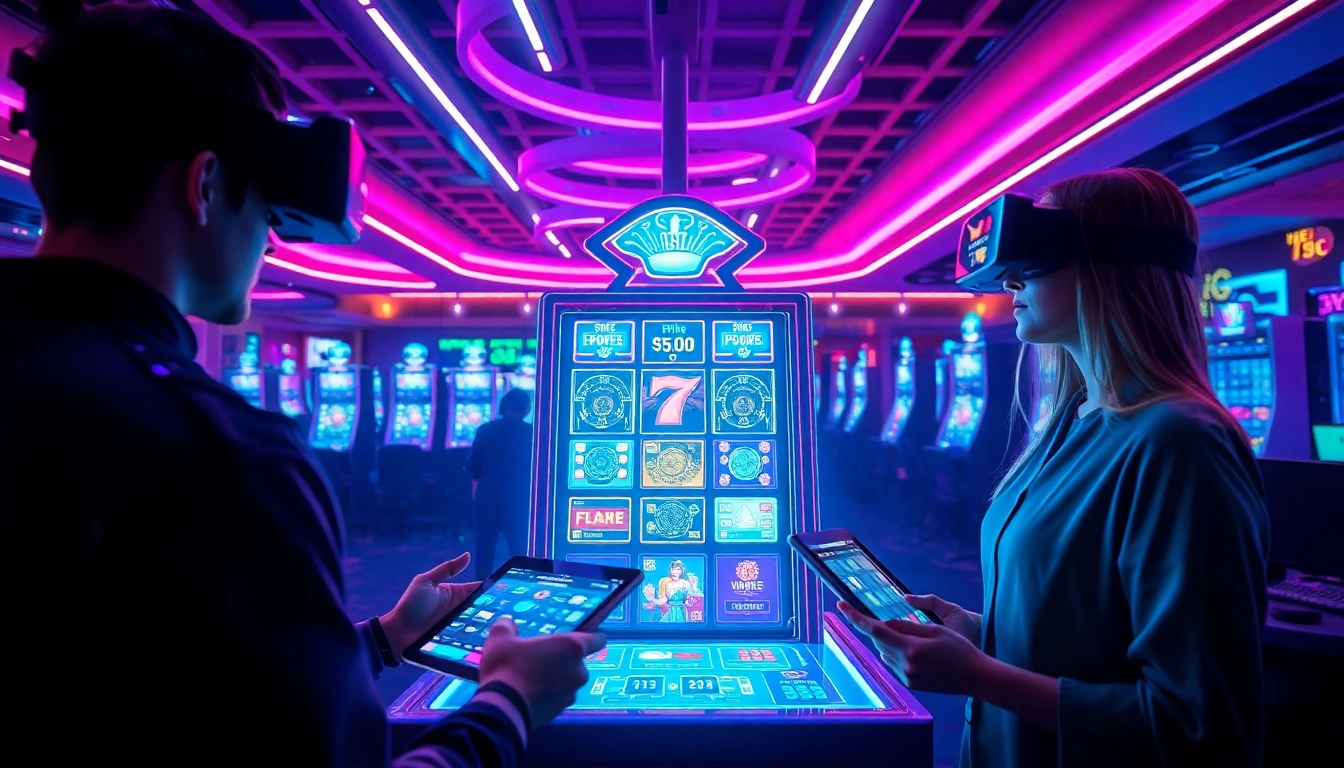Understanding New Technology in Gambling
With the rapid evolution of technology, the gambling industry is undergoing significant transformations, reshaping how players experience casino games. From augmented reality to blockchain technology, embracing new technology is no longer optional but a necessity for competitive survival in this lucrative market. In this article, we’ll explore various technological innovations in gambling, discussing their benefits, challenges, and future implications.
What is New Technology in Casino Gaming?
New technology in casino gaming encompasses a wide array of innovations designed to enhance the gaming experience, efficiency, and security. This may include state-of-the-art game development platforms, mobile gaming applications, live dealer technology, and the integration of artificial intelligence (AI) to tailor user experiences. The emergence of new gaming platforms, such as virtual and augmented reality casinos, allows players to immerse themselves in a fully interactive gaming environment without the constraints of physical locations.
Benefits of Embracing New Technology
Casinos that adopt new technology can unlock numerous benefits, including:
- Enhanced Player Experience: Features such as personalized game recommendations and interactive gameplay can lead to greater satisfaction among players.
- Operational Efficiency: Automation of processes, from customer service to payment processing, can significantly reduce operational costs.
- Increased Security: Technologies like blockchain and AI can provide more robust security measures against fraud, ensuring trust in the gaming experience.
- Wider Reach: Online gaming platforms powered by new technologies allow operators to reach players globally, thus expanding their customer base.
Challenges for Casinos Adopting New Technology
While the potential benefits are immense, the transition to new technology is fraught with challenges:
- Regulatory Hurdles: Keeping up with regulations that vary by jurisdiction can slow down the implementation of new technologies.
- High Initial Costs: Investing in cutting-edge technology can require significant upfront capital, which may be a barrier for some operators.
- Training Staff: Employees must be trained effectively to handle new technology, which can be resource-intensive.
- Cybersecurity Risks: The adoption of digital and online platforms exposes casinos to potential cybersecurity threats that need constant vigilance.
The Rise of Augmented Reality in Gambling
Exploring Augmented Reality Gaming Experiences
Augmented reality (AR) has increasingly become integrated into gambling experiences, merging the virtual and real worlds. By providing players with an interactive environment combined with real-world elements, AR enhances game immersion and user engagement. Players can enjoy experiences such as interactive poker tables where virtual chips and cards are overlaid onto the real-world environment, bringing a traditional casino feel to the home experience.
Examples of AR in Casino Gaming
Several casinos are pioneering the use of AR in their offerings:
- AR Poker Apps: These applications allow players to use their mobile devices to engage with virtual poker games overlaid on their tables, making for a unique gameplay experience.
- Live Games with AR Enhancements: Some live dealer games incorporate AR features that let players see additional information about the game, enhancing their interaction.
- Promotional Experiences: Casinos have utilized AR for marketing campaigns, including apps that allow users to scan physical locations to unlock prizes or bonuses.
Future Trends for Augmented Reality in Gambling
The potential of AR in gambling is immense, and we can anticipate further advancements that will blur the lines between physical and virtual gaming. Future trends may include:
- Fully Immersive Environments: Future AR platforms may offer a fully immersive casino experience in players’ homes, with realistic graphics and interactions.
- Social Gaming Experiences: AR can facilitate social gaming, allowing friends to engage in games together, regardless of their physical location.
- Enhanced Personalization: Utilizing data analytics, AR platforms can tailor experiences based on user preferences and gameplay history, creating a unique experience for each player.
Blockchain and Cryptocurrency: Revolutionizing Online Gambling
How Blockchain Technology is Impacting Security
Blockchain technology is redefining security in the gambling sector. This decentralized ledger system ensures transparency and immutability, making it nearly impossible for fraudulent activities to go unnoticed. Players can verify game fairness through smart contracts, which automatically execute terms based on predetermined conditions without the need for a governing body.
The Role of Cryptocurrency in Modern Casinos
Cryptocurrency offers an alternative payment method that has gained popularity in online gambling. The integration of cryptocurrencies like Bitcoin and Ethereum provides several advantages, including anonymous transactions that enhance player privacy, faster deposit and withdrawal times with lower fees, and a borderless gambling experience. This shift also opens up opportunities for a new demographic of players who prefer digital currencies over traditional banking methods.
Benefits of Blockchain for Players and Operators
Adopting blockchain technology in online casinos brings significant benefits:
- Increased Trust: The transparency afforded by blockchain leads to greater trust from players, who can independently verify game outcomes and financial transactions.
- Reduced Operation Costs: By eliminating intermediaries, blockchain can lower operational costs, benefiting both the casino and the players.
- Enhanced Regulatory Compliance: Blockchain can automate compliance with various gaming regulations, simplifying the reporting required by regulatory bodies.
Artificial Intelligence: Enhancing Player Experience
AI Applications in Personalized Gambling Advice
Artificial intelligence has the capability to revolutionize personalized gambling experiences. By analyzing player behavior and preferences, AI can offer tailored recommendations for games and strategies that align with individual player profiles. For instance, AI algorithms can suggest games similar to those a player has enjoyed based on their gaming history and patterns, helping players find new favorites while enhancing engagement.
Use Cases of AI for Fraud Detection
The gambling industry faces numerous risks associated with fraud, including cheating and money laundering. AI models can analyze transaction patterns in real-time to detect any suspicious activity and trigger alerts for further investigation. By leveraging machine learning techniques, casinos can preemptively identify fraud, ensuring a safer gaming environment for all users.
Improving Player Engagement with AI Technology
AI-driven chatbots and virtual assistants are increasingly utilized in casinos to provide support and enhance customer service. These tools can engage users during gameplay, offering real-time assistance and creating an interactive environment. Additionally, AI can analyze player interactions to improve user interfaces, ensuring they are intuitive and easy to navigate, ultimately leading to a better overall gaming experience.
Future Predictions: Where is Gambling Technology Headed?
Emerging Trends to Watch in the Gambling Industry
The gambling landscape is continually evolving, driven by technological advancements. Some notable trends to watch include:
- Integrated Gaming Platforms: Future casinos may feature integrated platforms that combine traditional gaming, sports betting, and esports to cater to diverse player interests.
- AI-driven Analytics: Operators are expected to leverage analytics more effectively to shape marketing strategies and improve player retention based on data-driven insights.
- Remote Gambling Regulations: As online gambling becomes more mainstream, regulatory frameworks may evolve, incorporating guidelines for player protection and responsible gambling practices.
How New Technology Will Shape Regulatory Frameworks
With the rise of new technologies, regulatory bodies must adapt to mitigate risks associated with these advancements. Future regulations may account for aspects such as player data protection, responsible gambling technologies, and the handling of cryptocurrency transactions. Continuous collaboration between technology providers and regulators will be crucial to develop frameworks that balance innovation and consumer protection.
The Evolving Landscape of Online Gambling Platforms
The online gambling landscape is becoming more competitive, with operators exploring diverse offerings to attract new players. The confluence of advanced technologies, including AR, VR, and AI, will create unique gaming environments that appeal to both casual players and hardcore enthusiasts. Mixing elements from gaming, entertainment, and social interaction, casinos are likely to become more than just gambling venues; they will evolve into full-fledged entertainment platforms.




